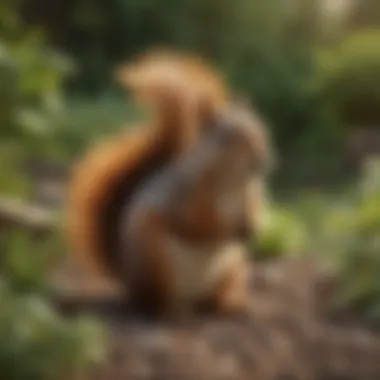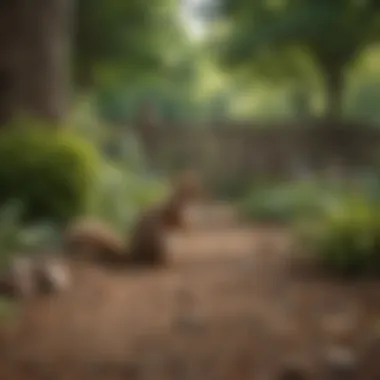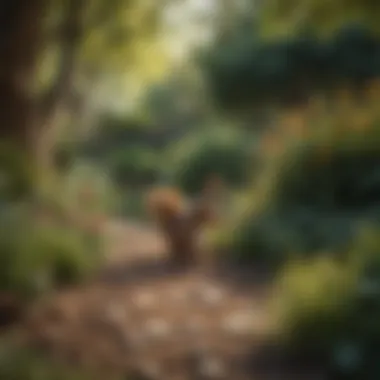Expert Strategies to Keep Squirrels from Digging in Your Yard and Maintain a Pristine Garden


Interior Design Tips
When considering ways to keep squirrels from digging in your yard and maintaining a pristine garden, it's essential to examine not only the outdoor space but also how interior design elements can play a role. By understanding the layout of your home and how it connects to your garden, you can develop effective strategies to deter squirrels. Color schemes and combinations can influence the choice of outdoor deterrents, as certain colors may naturally repel squirrels. Additionally, exploring furniture arrangement techniques that create barriers or boundaries between indoor and outdoor spaces can help protect your garden.
Entertaining Essentials
- Table Setting Inspiration
- Menu Planning Tips
- Party Theme Suggestions
Gardening Know-How
- Plant Care Guides
- Seasonal Gardening Tips
- DIY Garden Projects
Inspirational Home Decor
- Stylish Home Decor Pieces
- Wall Art and Prints
- Lighting and Ambiance
Outdoor Living Spaces
- Patio Design Inspiration
- Outdoor Furniture Trends
- Creating Cozy Outdoor Retreats
Understanding Squirrel Behavior
Squirrels are fascinating creatures with intricate behaviors that impact our outdoor spaces. Understanding Squirrel Behavior is crucial in implementing effective strategies to prevent them from digging in your yard. By delving into their habits and instincts, homeowners can proactively protect their gardens and maintain a pristine environment. From foraging patterns to nesting instincts, a comprehensive knowledge of squirrel behavior is key to safeguarding your outdoor sanctuary.
Squirrel Digging Habits
Squirrel foraging patterns play a significant role in their digging behavior. These creatures are known to meticulously search for food sources, often leading them to excavate gardens in pursuit of sustenance. Their relentless quest for nuts, fruits, and seeds drives them to dig with precision and persistence, causing disruptions in well-kept yards. On the other hand, the impact of nesting instincts on digging behavior sheds light on squirrels' need to create secure nesting sites. Their instinctual drive to build comfortable shelters for their young can result in extensive digging activities, posing a challenge for garden owners. While foraging patterns showcase squirrels' resourcefulness, nesting instincts amplify their digging tendencies, presenting a dual threat to garden aesthetics.


Reasons for Yard Digging
The reasons behind squirrel yard digging primarily revolve around their search for food sources and the creation of nesting sites. When exploring squirrel behavior, understanding their motivations is essential to effectively deter their digging activities. In the quest for food sources, squirrels exhibit determination and agility, scouring yards for hidden treasures. Their keen sense of smell guides them towards potential food reservoirs, prompting them to dig in various areas. Furthermore, the creation of nesting sites marks another pivotal aspect of squirrel behavior. By excavating soil and vegetation, squirrels establish safe havens for their offspring, ensuring their protection and comfort. While the search for food highlights squirrels' survival instincts, nesting site construction showcases their parental dedication, underscoring the need for tailored deterrent strategies to preserve garden aesthetics.
Impact of Understanding Squirrel Behavior
Comprehending squirrel behavior is paramount in effectively addressing yard digging concerns. By grasping the intricacies of their foraging patterns and nesting instincts, homeowners can implement targeted solutions to safeguard their outdoor spaces. With a profound understanding of why squirrels dig and the factors driving their behavior, proactive measures can be taken to mitigate potential damage. From natural deterrents to physical barriers, aligning strategies with squirrel behavior can lead to sustainable garden maintenance and unrivaled aesthetics.
In the realm of maintaining a flawless outdoor haven, preventing squirrels from wreaking havoc in your yard is a vital feat that demands careful consideration. These bushy-tailed invaders can disrupt the serenity of your garden with their enthusiastic digging escapades. To combat this menace effectively, a multifaceted approach involving natural deterrents becomes imperative in safeguarding the pristine allure of your outdoor space.
Natural Deterrents
In the holistic pursuit of deterring squirrels from wreaking havoc in your garden sanctuary, the deployment of natural deterrents emerges as a pivotal strategy. Unlike harsh chemicals or invasive methods, natural deterrents offer a harmonious solution that aligns with eco-friendly practices and ensures the well-being of your garden ecosystem. By incorporating elements from nature itself, such as plants and herbs, you establish a protective shield around your yard without causing harm to the environment or local wildlife.
Plant-based Solutions
The utilization of plants renowned for their potent odors stands out as a compelling method to dissuade squirrels from turning your garden into a playground. Strong-smelling plants exude fragrances that repel squirrels while adding a delightful aroma to your outdoor space. These botanical guardians not only safeguard your plants but also contribute to the aesthetic appeal of your garden, creating a sensory-rich environment that captivates all who wander within its bounds.
Use of strong-smelling plants
Among the array of natural deterrents, the incorporation of strong-smelling plants serves as a formidable defense mechanism against squirrel intrusion. Plants like lavender, marigold, and geraniums emit scents that repel squirrels, discouraging them from venturing near your prized flora. The distinct fragrance of these plants acts as a boundary that signals to squirrels that your garden is off-limits, preserving the sanctity of your outdoor haven.
Natural predators in the garden
Incorporating natural predators into your garden ecosystem introduces a biological ally in the battle against squirrel disruptions. Beneficial predators such as owls, hawks, and snakes serve as silent sentinels that deter squirrels through natural intimidation, creating a harmonious balance within your garden's microcosm. By leveraging these natural adversaries, you instill a sense of caution in squirrels, dissuading them from encroaching upon your meticulously curated landscape.
Spices and Herbs
Beyond the realm of botanical deterrents, the strategic placement of spices and herbs can further fortify your defenses against squirrel incursions. Substances like cayenne pepper and peppermint oil possess properties that squirrels find unappealing, deterring them from foraging or nesting in your garden beds. These aromatic elements not only safeguard your plants but also infuse your garden with added layers of protection, ensuring a tranquil haven free from unwelcome furry visitors.


Cayenne pepper
The pungent essence of cayenne pepper acts as a potent squirrel deterrent, creating a deterrent barrier that safeguards your garden from unwanted intruders. By incorporating cayenne pepper into your gardening repertoire, you introduce a fiery deterrent that signals to squirrels to steer clear of your precious plants, maintaining the integrity of your outdoor oasis.
Peppermint oil
Renowned for its refreshing scent, peppermint oil emerges as a versatile tool in combating squirrel disruptions in your yard. Its invigorating aroma not only masks any enticing odors that might attract squirrels but also acts as a natural repellent that dissuades these critters from venturing near your garden. By harnessing the power of peppermint oil, you establish a fragrant barrier that safeguards your outdoor space, ensuring a serene environment free from unwanted disturbances.
Physical Barriers
In the realm of keeping squirrels from meddling with your yard, the deployment of physical barriers emerges as a pivotal strategy. These barriers serve as formidable obstacles that deter squirrels from infiltrating your garden sanctuary. By impeding the access of furry intruders to your plants and flower beds, physical barriers play a crucial role in maintaining the pristine condition of your outdoor space. By opting for physical barriers, homeowners can effectively safeguard their beloved greenery from the destructive tendencies of squirrels.
Fencing Solutions
Wire mesh fencing
When it comes to fortifying your garden against squirrel invasions, wire mesh fencing stands out as a stalwart option. This type of fencing boasts a robust construction that offers unparalleled protection against agile creatures like squirrels. The key characteristic of wire mesh fencing lies in its durability and flexibility, making it a popular choice for mitigating the risks posed by squirrel activities. The unique feature of wire mesh fencing lies in its ability to provide a seamless blend of security and aesthetics, enhancing the overall appeal of your garden landscape. While wire mesh fencing is renowned for its efficiency in warding off squirrels, it is essential to consider its installation costs and maintenance requirements when incorporating it into your anti-squirrel defense plan.
Electric fencing options
In the realm of squirrel deterrence, electric fencing options prove to be a cutting-edge solution for promoting garden protection. These fencing options are equipped with electrified elements that emit pulses of electricity, creating a potent deterrent against squirrels and other garden intruders. The standout characteristic of electric fencing lies in its efficacy in delivering a non-lethal yet impactful shock to deter squirrels from breaching your garden's boundaries. This feature makes electric fencing a highly favored choice for homeowners seeking advanced security measures to safeguard their outdoor haven. However, it is imperative to weigh the advantages of enhanced protection against the potential disadvantages of increased installation complexity and maintenance requirements associated with electric fencing options.
Mulching Techniques
Effective mulching techniques play a pivotal role in fortifying your garden against the invasive tendencies of squirrels. By strategically implementing mulch materials, homeowners can create impediments that discourage squirrels from digging in their yard. Understanding the nuances of various mulching techniques is crucial for orchestrating a comprehensive defense strategy against squirrel incursions.
Use of sharp mulch materials
Utilizing sharp mulch materials like pine cones or nut shells constitutes a strategic move in deterring squirrels from rummaging through your garden. The key characteristic of sharp mulch materials lies in their prickly texture, which acts as a natural deterrent against squirrels seeking to forage or nest in your yard. The unique feature of sharp mulch materials lies in their dual functionality of enhancing soil health while simultaneously repelling unwanted critters. By leveraging the advantages of using sharp mulch materials, homeowners can effectively protect their garden beds from squirrel-induced damage.


Depth of mulch layer
Maintaining an optimal depth of mulch layer is essential in fortifying your garden against squirrel disturbances. The key characteristic of ensuring an adequate mulch layer depth lies in its ability to form a protective barrier that hampers squirrel activities. By maintaining an adequate mulch layer depth, homeowners can create an additional layer of defense against squirrel intrusions, thus safeguarding the integrity of their garden. As you consider the depth of mulch layer for your garden, it is crucial to weigh the advantages of enhanced protection against the potential disadvantages of increased mulch material requirements and maintenance efforts associated with deeper mulch layers.
Humane Repellents
In the intricate world of safeguarding your yard from the persistent digging of squirrels, humane repellents emerge as a pivotal aspect in this narrative. These repellents signify a humane approach to deterring these critters without causing harm. By opting for solutions that prioritize the well-being of animals while effectively protecting your garden, you can achieve a harmonious balance between nature and personal space. Understanding the significance of humane repellents not only aligns with ethical considerations but also ensures a sustainable method of addressing the squirrel intrusion.
Ultrasonic Devices
Delving deeper into the realm of humane repellents, ultrasonic devices stand out as a modern and innovative solution to squirrel deterrence. The specific focus here lies on the effectiveness of ultrasonic devices in thwarting squirrels' unwanted presence in your yard. These devices operate by emitting high-frequency sound waves that are unpleasant to squirrels, prompting them to steer clear of the area. Their non-invasive nature makes them a popular choice amongst homeowners seeking a peaceful coexistence with wildlife. Moreover, the unique feature of ultrasonic devices lies in their ability to deter squirrels without causing them any harm, making them an ideal humane repellent for maintaining a pristine garden environment.
Motion-Activated Sprinklers
Another ingenious method in the realm of humane repellents is the concept of behavior modification through water deterrents, as exemplified by motion-activated sprinklers. These devices detect motion in the designated area and unleash a sudden burst of water, startling the intruding squirrels and discouraging further visits. The key characteristic of motion-activated sprinklers lies in their ability to provide a swift and effective response to squirrel activity, thereby instigating a behavior change in these animals. The advantage of using motion-activated sprinklers as a humane repellent lies in their non-lethal approach to deterring squirrels, offering a humane and eco-friendly solution to maintaining the integrity of your garden space.
Consistent Yard Maintenance
Consistent yard maintenance is a crucial aspect of ensuring a pristine garden that remains free from the destructive habits of squirrels. By diligently upkeeping your outdoor space, you not only enhance its visual appeal but also discourage squirrels from wreaking havoc. One key element of consistent yard maintenance is the regular upkeep to prevent any opportunities for squirrels to dig or nest. This practice involves ongoing monitoring and proactive measures to address any potential attractants that could invite squirrels into your yard. By prioritizing consistent yard maintenance, homeowners can effectively create an environment that is inhospitable to squirrels, promoting a harmonious coexistence with the local wildlife.
Regular Cleanup Practices
Effective yard maintenance starts with implementing regular cleanup practices that help deter squirrels from digging in your yard. Two essential components of regular cleanup are:### Remove Fallen Fruits and Nuts To prevent squirrels from foraging in your yard, a key step is to promptly remove fallen fruits and nuts. Squirrels are attracted to these food sources, and leaving them on the ground can incentivize digging behavior. By consistently clearing away fallen fruits and nuts, homeowners can minimize the appeal of their yard to squirrels, reducing the likelihood of unwanted digging activities. This practice not only maintains the tidiness of the garden but also serves as a proactive deterrent against squirrel intrusion.### Maintain a Clutter-Free Yard In addition to removing food sources, maintaining a clutter-free yard is essential in discouraging squirrel activity. Squirrels are adept at utilizing cluttered spaces for nesting or hiding, making a clutter-free environment less conducive to their presence. Keeping the yard organized and free of debris reduces potential shelters for squirrels, forcing them to seek alternative locations away from your property. By prioritizing a clutter-free yard, homeowners can significantly decrease the attractiveness of their garden to squirrels, thereby safeguarding the integrity of their outdoor space.
Scare Tactics
As part of a comprehensive approach to deterring squirrels, incorporating scare tactics can further enhance your yard protection efforts. Two effective scare tactics include:
Use of Motion-Activated Devices
Motion-activated devices are a popular choice for discouraging squirrel activity in the yard. These devices emit loud noises or sudden movements when triggered by squirrel presence, startling the animals and deterring them from frequenting the area. Their automated nature ensures a proactive response to squirrel incursions, reinforcing the message that your yard is not a welcome environment. By strategically placing motion-activated devices in vulnerable areas, homeowners can dissuade squirrels from digging or nesting, maintaining a pristine garden space free from wildlife disturbances.
Visual Deterrents
Visual deterrents, such as scarecrows or reflective surfaces, can also play a role in deterring squirrels from frequenting your yard. These visual cues disrupt the squirrels' sense of security, making them wary of exploring the area further. By utilizing visual deterrents strategically throughout the yard, homeowners can create an environment that appears inhospitable to squirrels, encouraging them to seek alternative locations for nesting or foraging. Incorporating visual deterrents as part of your overall yard maintenance strategy contributes to a comprehensive approach to squirrel deterrence, safeguarding your garden against potential damage and preserving its pristine condition.







